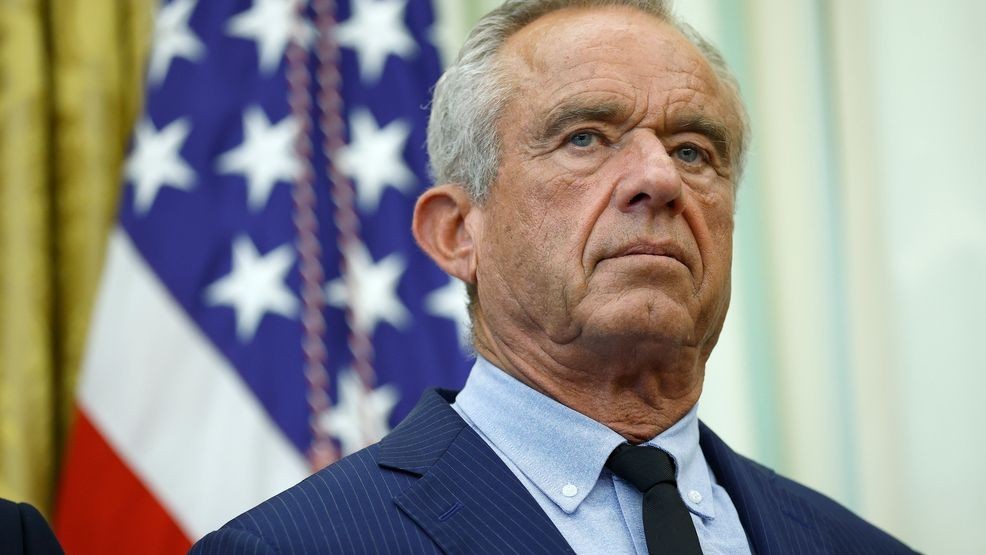Listen to the article
The Biden administration’s offshore wind energy initiatives have encountered new obstacles as Health and Human Services Secretary Robert F. Kennedy Jr. has directed the Centers for Disease Control and Prevention to investigate potential health and economic impacts of offshore wind farms, according to Bloomberg News.
This investigation aligns with President Donald Trump’s longstanding criticism of wind energy projects. Since returning to office, Trump has taken several concrete steps to curtail the offshore wind industry that expanded during his predecessor’s term.
The American Bird Conservancy’s data lends some credence to Trump’s characterization of wind farms as “eagle graveyards.” In 2021, the organization estimated that approximately 681,000 birds die annually from collisions with wind turbines across the United States, raising legitimate wildlife conservation concerns.
Environmental impacts represent just one facet of the administration’s critique of wind energy. Trump has repeatedly claimed that wind energy is “many, many times more expensive than clean natural gas,” as reported by Reuters. This economic argument, however, remains disputed among energy analysts and economists who point to the declining costs of renewable technologies and the necessity to factor in externalities when comparing different energy sources.
Taking decisive action earlier this year, Trump signed an executive order suspending new federal offshore wind leasing and halting approvals for pending wind projects. The administration also canceled $679 million in federal funding previously allocated to twelve offshore wind projects, signaling a dramatic shift in U.S. energy policy priorities.
The investigation extends beyond Kennedy’s Health and Human Services Department. Interior Secretary Doug Burgum has raised separate concerns about potential national security implications of wind farms, suggesting they could interfere with military operations.
These concerns find some validation in a Government Accountability Office report indicating that wind turbine blades can potentially interfere with radar systems, reducing detection sensitivity and generating false targets. However, both the Department of Energy and Department of Defense have maintained that such issues are manageable through proper planning and have not meaningfully compromised U.S. defense capabilities thus far.
The administration’s scrutiny of offshore wind comes at a critical juncture for the renewable energy sector. Under the Biden administration, offshore wind was positioned as a cornerstone of America’s clean energy transition, with ambitious targets to deploy 30 gigawatts of offshore wind capacity by 2030. These goals were supported by significant federal investments and regulatory streamlining.
Industry analysts note that this policy reversal creates substantial uncertainty for clean energy investors and developers who had committed billions of dollars to offshore wind projects along the Eastern Seaboard. Several major projects already under construction face potential complications from shifting federal priorities.
The economic stakes are considerable. The offshore wind industry has been projected to create thousands of jobs in manufacturing, construction, and maintenance, particularly in coastal communities seeking economic revitalization. Labor unions and state officials in places like New York, Massachusetts, and New Jersey have expressed concern about the potential loss of these economic opportunities.
Environmental organizations have criticized the administration’s moves as prioritizing fossil fuel interests over climate action, while some coastal community groups who had opposed offshore wind developments on aesthetic or fishing industry grounds have welcomed the scrutiny.
As federal agencies conduct their investigations, state-level support for offshore wind varies significantly, with some governors maintaining commitments to renewable energy goals regardless of federal policy shifts, creating a complex regulatory landscape for the industry to navigate.
The outcome of these investigations will likely shape the trajectory of America’s offshore wind industry for years to come, with significant implications for the nation’s energy mix, coastal economies, and climate commitments.
Fact Checker
Verify the accuracy of this article using The Disinformation Commission analysis and real-time sources.




6 Comments
Trump’s claims about the relative costs of wind vs. natural gas seem oversimplified. Energy economics are complex, and objective analysis is needed to understand the true costs and tradeoffs. I hope this investigation looks at the issue from multiple angles.
This is an interesting development. Concerns about the environmental and economic impacts of wind farms warrant further investigation, but it’s important to rely on objective data and analysis rather than political rhetoric. I’m curious to see what the CDC’s findings reveal.
This is a sensitive and politically-charged topic. I appreciate the Biden administration’s commitment to renewable energy, but they need to address legitimate concerns about the environmental and economic impacts of wind farms. Rigorous, impartial analysis is crucial here.
The bird mortality statistics from the American Bird Conservancy are concerning. Wind farm development should prioritize wildlife protection and minimize adverse environmental impacts. That said, we need to weigh those costs against the benefits of renewable energy.
While wind energy has its drawbacks, it’s still a critical part of the clean energy transition. The Biden administration’s offshore wind initiatives are ambitious, but they need to be balanced with thorough assessment of potential risks. I hope this investigation provides constructive insights.
This is a nuanced issue that deserves careful, impartial examination. While the environmental and economic impacts of wind farms warrant scrutiny, we should also consider the broader benefits of renewable energy in addressing climate change. I hope this investigation yields constructive insights.